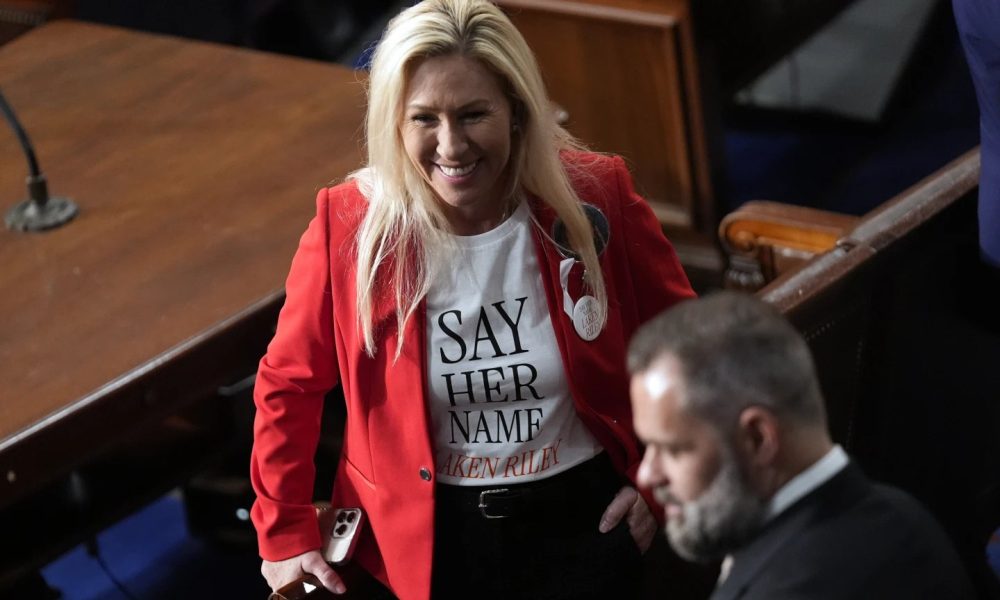Politics and Current
How Black Women Invented the ‘Say Her Name’ Cry

Marjorie Taylor Greene appeared at Thursday night’s State of the Union address wearing a T-shirt that carried a seemingly easy message: Say her name.
The tough Republican congresswoman from Georgia, wearing a red MAGA hat and other regalia, borrowed the term from black racial justice activists who called attention to the extrajudicial deaths of black women at the hands of police and vigilantes.
However, Greene used the shoutout to successfully get President Joe Biden to say the name of Laken Riley, a nursing student from Georgia whose death is currently at the center of the US immigration debate. A Venezuelan immigrant who entered the U.S. illegally was arrested in the Riley case and charged with murder.
Riley’s name is a rallying cry from Republicans criticizing the president’s handling of the record wave of immigrants entering the country across the U.S.-Mexico border.
The origins of the “Say her name” chant date back long before Greene donned the T-shirt.
Who first coined the phrase “Say her name” in protest?
The phrase was popularized by civil rights activist, law professor and executive director of the African American Policy Institute Kimberle Crenshaw in 2015, after the death of Sandra Bland. Bland, a 28-year-old black woman, was found dead in a Texas jail cell days after she was arrested during a traffic stop. Her family challenged the circumstances of her death and the validity of the traffic stop, and a 12 months later settled a wrongful death lawsuit with the police.
Black women are statistically more likely than other women to witness and experience police violence, including death, which has also been linked to increased psychological distress and a number of other related negative health outcomes.
“Everywhere we see the appropriation of progressive and inclusive concepts to devalue, distort and suppress the movements they were created to advance,” Crenshaw said in an announcement to the Associated Press. “When most people hear about these ideas only from those who want to change and devalue them, our ability to speak truth to power is even more limited.”
Greene’s adoption of the phrase “undermines the civil rights movement and pushes our democracy closer to the brink,” Crenshaw wrote in her statement. “If we are to remain steadfast in our advocacy for a fully inclusive and shared future, the misuse of these concepts by others who seek to silence us must be confronted.”
Featured Stories
Tamika Mallory, a racial justice advocate and creator, stated that Laken Riley deserves justice, but on this case she doesn’t consider that conservatives are using #SayHerName in a sincere way. “If they did, they wouldn’t use language they supposedly didn’t favor,” she said. “They demonize our language, they demonize our style of organizing, but they co-opt language whenever they think it’s a political tool.”
Who are the other black women on “Say Her Name”?
Crenshaw and others began using the phrase to attract attention to cases wherein black women turn out to be victims of police brutality. In 2020, the hashtag #SayHerName helped bring closer public scrutiny to the shooting of Breonna Taylor, a 26-year-old Black woman in Louisville, Kentucky, who was shot to death in her home during a botched police raid.
Crenshaw said the campaign was founded to interrupt the silence around Black women, girls and femmes whose lives have been taken by police.
“The list of women killed in deadly clashes with law enforcement and whose families continue to demand justice is long. Tanisha Anderson, Michelle Shirley, Sandra Bland, Miriam Carey, Michelle Cusseaux, Shelly Frey, Breonna Taylor, Korryn Gaines, Kayla Moore, Atatiana Jefferson and India Kager are just some of the many names we lift up – women whose stories too often differ passed away from each other unspeakably. We must call out and resist this attempt to direct this campaign to serve the agenda of the extremist right.”